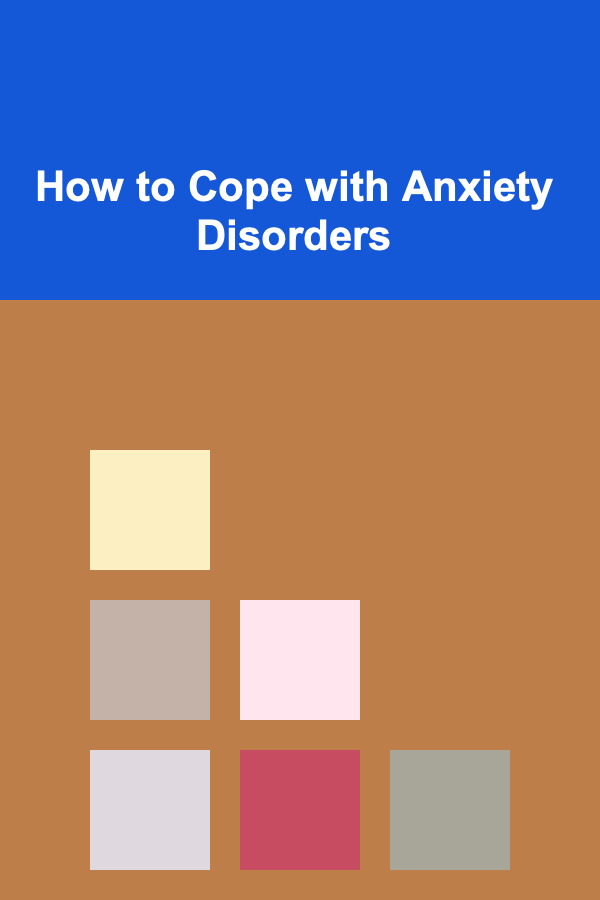
How to Cope with Anxiety Disorders
ebook include PDF & Audio bundle (Micro Guide)
$12.99$10.99
Limited Time Offer! Order within the next:

Anxiety disorders affect millions of people worldwide, making them one of the most prevalent mental health issues. Whether it's generalized anxiety disorder, social anxiety, panic disorder, or another form, anxiety can have a profound impact on a person's quality of life. The good news is that anxiety disorders are treatable, and there are various strategies that can help individuals cope with their symptoms. This article aims to provide a comprehensive guide on how to cope with anxiety disorders, offering insights into both immediate and long-term strategies that can help improve mental health.
Understanding Anxiety Disorders
Before diving into coping strategies, it's essential to understand what anxiety disorders are. Anxiety is a natural and necessary response to stress. It's the body's way of reacting to perceived threats, preparing it for a "fight or flight" response. However, when this response becomes chronic or disproportionate to the situation, it may develop into an anxiety disorder.
Anxiety disorders are characterized by excessive worry, fear, or nervousness that interferes with daily life. The different types of anxiety disorders include:
- Generalized Anxiety Disorder (GAD): Characterized by excessive worry about everyday life, often without any specific reason.
- Panic Disorder: Characterized by recurrent and unexpected panic attacks, which can cause intense fear and discomfort.
- Social Anxiety Disorder: Characterized by a fear of social situations, where individuals worry about being judged or embarrassed.
- Obsessive-Compulsive Disorder (OCD): Characterized by obsessive thoughts and compulsive behaviors.
- Post-Traumatic Stress Disorder (PTSD): Occurs after experiencing or witnessing a traumatic event, leading to flashbacks, nightmares, and intense anxiety.
The symptoms of anxiety disorders can vary, but they often include feelings of restlessness, fatigue, difficulty concentrating, irritability, and physical symptoms such as heart palpitations, sweating, and dizziness. These symptoms can interfere with daily activities and cause significant distress.
Coping Strategies for Anxiety Disorders
While anxiety disorders can be challenging to manage, there are numerous ways to cope with them. Below are some evidence-based strategies that have been shown to help individuals manage anxiety effectively.
1. Cognitive Behavioral Therapy (CBT)
Cognitive Behavioral Therapy (CBT) is one of the most effective treatments for anxiety disorders. CBT is a form of psychotherapy that helps individuals identify and change negative thought patterns that contribute to their anxiety. The core idea behind CBT is that our thoughts, emotions, and behaviors are interconnected. By changing negative thought patterns, individuals can reduce anxiety and adopt healthier behaviors.
How CBT Helps with Anxiety:
- Identifying Cognitive Distortions: Many individuals with anxiety engage in cognitive distortions, such as catastrophizing (expecting the worst outcome) or overgeneralizing (thinking that one negative event defines their entire life). CBT helps individuals recognize these distortions and replace them with more balanced thoughts.
- Behavioral Experiments: CBT often involves testing beliefs through "experiments." For example, someone with social anxiety might gradually expose themselves to social situations and learn that their fears of embarrassment or judgment are often exaggerated.
- Mindfulness and Relaxation Techniques: CBT often incorporates mindfulness and relaxation techniques to help individuals manage physical symptoms of anxiety, such as muscle tension or rapid breathing.
2. Mindfulness and Meditation
Mindfulness and meditation have become increasingly popular as tools for managing anxiety. Both practices involve focusing on the present moment and cultivating an attitude of acceptance and non-judgment.
How Mindfulness and Meditation Help with Anxiety:
- Reducing Rumination: Rumination, or repetitive negative thinking, is a common symptom of anxiety. Mindfulness helps individuals become aware of their thoughts and emotions without getting caught up in them, allowing them to let go of unhelpful ruminations.
- Decreasing Stress Response: Meditation and mindfulness have been shown to activate the parasympathetic nervous system, which is responsible for the body's relaxation response. This can help reduce the physical symptoms of anxiety, such as increased heart rate and shallow breathing.
- Enhancing Emotional Regulation: Regular mindfulness practice can improve emotional regulation, allowing individuals to respond to anxiety-provoking situations with greater calm and clarity.
3. Exposure Therapy
Exposure therapy is a specific form of CBT that involves gradually confronting the feared object or situation in a controlled and systematic way. This technique is particularly effective for individuals with phobias or social anxiety.
How Exposure Therapy Helps with Anxiety:
- Desensitization: The goal of exposure therapy is to help individuals become desensitized to their fears by gradually increasing their exposure to anxiety-provoking situations. Over time, the individual learns that their fears are often irrational or that they can tolerate anxiety without catastrophe occurring.
- Building Confidence: By successfully facing feared situations, individuals gain confidence in their ability to cope with anxiety, reducing the overall intensity of their fear.
4. Breathing Techniques
Breathing exercises are an immediate and effective way to reduce the physical symptoms of anxiety, such as rapid heart rate and shallow breathing. One popular breathing technique is diaphragmatic breathing, also known as abdominal breathing.
How Breathing Techniques Help with Anxiety:
- Activating the Relaxation Response: Slow, deep breathing activates the parasympathetic nervous system, which counteracts the body's stress response and promotes relaxation.
- Regulating the Stress Response: Deep breathing can help regulate the body's stress response by lowering levels of cortisol (the stress hormone) and improving oxygen flow to the brain.
- Reducing Hyperventilation: Anxiety often leads to hyperventilation, which can exacerbate symptoms of dizziness and shortness of breath. Slow, controlled breathing can prevent or mitigate this response.
5. Exercise and Physical Activity
Regular physical activity is a powerful tool for managing anxiety. Exercise releases endorphins, which are natural mood boosters, and it also reduces levels of cortisol, the stress hormone.
How Exercise Helps with Anxiety:
- Reducing Tension: Physical activity helps release built-up tension in the body, which can alleviate physical symptoms of anxiety, such as muscle tightness and headaches.
- Improving Sleep: Anxiety often disrupts sleep, but regular exercise can improve sleep quality by reducing the time it takes to fall asleep and increasing deep sleep stages.
- Boosting Self-Esteem: Regular exercise can improve self-esteem and body image, both of which are often negatively affected by anxiety disorders.
6. Social Support
Having a strong social support network can be a key factor in managing anxiety. Talking to friends, family, or a therapist can provide emotional validation, reassurance, and perspective.
How Social Support Helps with Anxiety:
- Providing Comfort and Reassurance: Speaking with a trusted person can provide comfort and help individuals feel less isolated. Just knowing that someone else understands can alleviate feelings of loneliness and stress.
- Offering Different Perspectives: Loved ones can offer different perspectives and remind individuals that their worries may not be as significant as they seem in the moment.
- Encouraging Healthy Coping: Having someone who encourages healthy coping strategies, such as engaging in hobbies or going for walks, can motivate individuals to take positive steps toward managing their anxiety.
7. Lifestyle Modifications
Certain lifestyle changes can also contribute to anxiety reduction. These changes can improve overall well-being and reduce the triggers that contribute to anxiety.
Lifestyle Changes for Anxiety:
- Balanced Diet: A nutritious diet that includes fruits, vegetables, whole grains, and healthy fats can support mental health. Avoiding excessive caffeine and alcohol can also prevent anxiety from worsening.
- Adequate Sleep: Poor sleep can exacerbate anxiety, so it's important to maintain a consistent sleep schedule and practice good sleep hygiene.
- Time Management: Overloading oneself with responsibilities can lead to stress and anxiety. Setting realistic goals, breaking tasks into manageable steps, and learning to say no can help reduce feelings of overwhelm.
8. Medication
In some cases, anxiety disorders may require medication, particularly when symptoms are severe or when other treatments have not been effective. Medications used to treat anxiety include:
- Antidepressants: Selective serotonin reuptake inhibitors (SSRIs) and serotonin-norepinephrine reuptake inhibitors (SNRIs) are commonly prescribed to treat anxiety.
- Benzodiazepines: These medications are sometimes used for short-term relief of acute anxiety but are not recommended for long-term use due to their potential for dependence.
- Beta-Blockers: These medications are used to reduce the physical symptoms of anxiety, such as rapid heart rate and shaking.
Medication should always be prescribed and monitored by a healthcare provider, as it may have side effects and requires careful management.
Conclusion
Coping with anxiety disorders is an ongoing process that requires patience, self-compassion, and the willingness to explore various treatment options. Whether through therapy, lifestyle changes, or support systems, managing anxiety is possible. By implementing evidence-based coping strategies such as cognitive behavioral therapy, mindfulness, exercise, and seeking social support, individuals can improve their ability to manage anxiety and lead fulfilling lives. It is also essential to recognize that everyone's journey with anxiety is unique, and finding the right combination of strategies that work for each individual is key to long-term success. If you or someone you know is struggling with anxiety, seeking professional help can provide additional guidance and support in navigating this complex and often overwhelming experience.
Reading More From Our Other Websites
- [Personal Care Tips 101] How to Manage Dry Scalp and Flaky Hair Naturally
- [Personal Care Tips 101] How to Choose a Face Mask for a Pampering Self-Care Day
- [Skydiving Tip 101] Best Techniques for Accurate Target Landing in Small Drop Zones
- [Home Rental Property 101] How to Maximize Privacy and Security in Rentals with a Private Entrance
- [Personal Care Tips 101] How to Choose the Best Mouthwash for Whitening Teeth
- [Tiny Home Living Tip 101] How to Create a Pet‑Friendly Tiny Home Environment Without Compromising Space
- [Toy Making Tip 101] Needlework Nostalgia: Classic Hand-Sewn Toys You Can Make Today
- [Home Family Activity 101] How to Organize a Family Talent Show at Home
- [Horseback Riding Tip 101] From Pony Kids to Adult Enthusiasts: How to Keep Your Riding Skills Growing
- [Personal Care Tips 101] How to Choose the Best Face Mask for Dehydrated Skin

How to Build an Effective Home Camera System for Every Angle
Read More
How to Build and Sell Deep Learning-Powered Apps for Profit
Read More
How to Declutter Your Wellness Space for Better Focus
Read More
How to Design a Functional Home Office That Saves Space
Read More
How to Maximize Rental Income with Simple Home Improvements
Read More
How To Deal with Different Financial Habits
Read MoreOther Products

How to Build an Effective Home Camera System for Every Angle
Read More
How to Build and Sell Deep Learning-Powered Apps for Profit
Read More
How to Declutter Your Wellness Space for Better Focus
Read More
How to Design a Functional Home Office That Saves Space
Read More
How to Maximize Rental Income with Simple Home Improvements
Read More